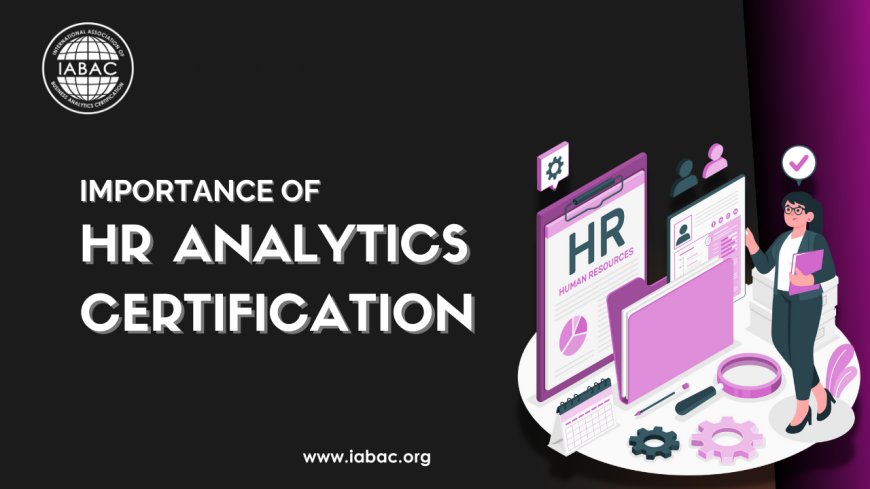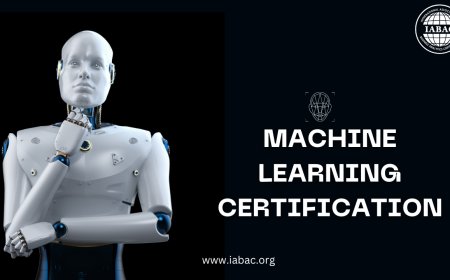The Importance of HR Analytics Certification
Learn the significance of HR analytics certification, its impact on workforce management, and strategic decision-making in organizations.

In today’s job market, there is a growing need for HR professionals who can use data to make better decisions. Companies are increasingly looking for people who have skills in HR analytics to help them understand their workforce and improve their HR practices. Getting certified in HR analytics can greatly boost your career. It gives you the knowledge and tools to analyze employee data effectively, making you a valuable asset to any organization. With an HR analytics certification, you can stand out to employers and open up more opportunities for career growth and advancement.
What is HR Analytics Certification?
An HR analytics certification is proof that you have learned how to use data to make better decisions in human resources. It involves taking courses that teach you how to gather, understand, and use employee data to improve HR tasks like hiring, managing performance, and keeping employees happy. This certification shows employers that you can use data to solve HR problems.
Reasons to Get an HR Analytics Certification
Getting an HR analytics certification has several benefits:
-
Learning New Skills: You will gain important skills in working with data and using technology in HR.
-
Career Growth: A certification can help you stand out when looking for a job or aiming for a promotion. It shows you have the skills to help a company with its HR needs.
-
Better Decisions: With the knowledge from the certification, you can make better choices in managing people and solving HR issues.
-
Staying Current: The certification helps you keep up with the latest tools and methods in HR analytics.
Types of Certifications
There are different levels of HR analytics certifications, depending on your experience and what you want to learn:
1. Beginner Level
Basic Courses: These are for people who are new to HR analytics. They cover the basics, like understanding data and simple HR tools.
Introductory Programs: These programs teach you the fundamentals of using data in HR without needing any prior experience.
2. Intermediate Level
-
Focused Certifications: These are for those with some HR or data experience. They go into more detail on specific topics like predicting future trends or creating data reports.
-
Hands-On Learning: These courses often include projects where you can practice what you’ve learned in real-world HR scenarios.
3. Advanced Level
-
Expert Certifications: These are for people who already have a lot of experience in HR or data analysis. They teach advanced techniques and tools for deep data analysis in HR.
-
Strategic Use: Advanced programs often focus on how to use data to make big-picture decisions and improve overall HR strategy.
Pick the certification that matches your current skills and career goals. Whether you're just starting or looking to deepen your expertise, there’s a certification level that can help you progress in HR analytics.
Importance of HR Analytics Certification
Getting an HR analytics certification can greatly help your career. Here’s why it matters:
1. Market Demand: More Companies Want HR Analytics Skills
These days, businesses are looking for HR professionals who know how to use data to improve their HR practices. They want people who can help them understand things like why employees stay or leave, how to improve hiring, and how to boost employee performance. With the rise of data in HR, having skills in HR analytics makes you more valuable to employers because they need these insights to make better decisions.
2. Competitive Advantage: Standing Out in the Job Market
When you have an HR analytics certification, you show that you have special skills that others might not have. This can help you stand out when applying for jobs or seeking promotions. Employers are often looking for candidates who can offer something extra, and being certified in HR analytics can give you that edge. It shows you have taken the time to learn and can bring new abilities to your team.
3. Credibility and Recognition: Building Trust
Having a certification also adds to your credibility. It’s proof that you’ve learned and been tested on HR analytics. This makes employers and colleagues more likely to trust your abilities and rely on your insights. Certification signals that you are serious about your professional growth and have achieved a level of expertise in using data for HR. This trust and recognition can help you advance in your career and earn respect from others in your field.
In short, an HR analytics certification is important because more companies need these skills, it helps you stand out in the job market, and it builds trust and recognition from employers and peers.
Benefits of HR Analytics Certification
Earning an HR analytics certification can help you in many practical ways. Here’s how:
1. Enhanced Skill Set: Learning Key HR Analytics Skills
An HR analytics certification teaches you important skills. You’ll learn how to analyze data, make detailed reports, and use modern HR technology. These skills help you understand what the data is telling you about things like hiring trends, employee performance, and job satisfaction. Knowing how to work with data means you can make better decisions in HR.
2. Career Advancement: Moving Up in Your Job
Having an HR analytics certification can help you get ahead in your career. It can make you a stronger candidate for promotions and even leadership roles. Many companies are looking for people who can bring data skills to their HR teams. With this certification, you might also be able to earn higher salaries because you have special skills that are in demand.
3. Practical Application: Using Skills to Solve HR Problems
An HR analytics certification teaches you how to apply what you learn to real-world HR issues. You’ll know how to use data to solve problems like improving recruitment, boosting employee engagement, and managing performance. This practical knowledge makes you more effective in your job and valuable to your company.
4. Networking Opportunities: Meeting Other Professionals
When you take a certification course, you can meet and connect with other HR professionals and experts. This networking is valuable because you can share ideas, learn new things, and stay updated on trends in HR analytics. These connections can help you grow in your career and find new opportunities.
In short, an HR analytics certification helps you learn important data skills, move up in your career, solve real HR problems, and connect with other professionals. These benefits make a big difference in how you contribute to your organization and in your career growth.
Key Components of an HR Analytics Certification Program
1. Core Curriculum
-
Data Collection and Management: Learn to gather and handle HR data from sources like surveys and performance reviews. Understand data privacy basics.
-
Statistical Analysis: Learn to analyze HR data using tools like Excel or Python. Understand how to interpret data to make HR decisions.
-
Predictive Modeling: Use past data to predict future trends like employee turnover. Learn to build simple models for these predictions.
-
HR Metrics and KPIs: Understand key HR metrics such as time to hire and employee engagement. Learn to create dashboards to track these metrics.
-
Strategic HR Analytics: Connect data insights to business goals. Learn to present your findings to others in your company.
2. Hands-On Learning
-
Practical Projects: Work on real or simulated projects to apply what you've learned. For example, analyze reasons for employee turnover.
-
Case Studies: Study real examples where HR analytics made a difference. Learn the methods used and the challenges faced.
-
Simulations and Labs: Participate in exercises and use software tools to analyze data and present results.
3. Assessment and Certification
-
Certification Exams: Take exams that test your HR analytics knowledge and skills. These might include multiple-choice questions or practical tasks.
-
Practical Assessments: Complete projects that show your ability to use analytics in HR. Get feedback from instructors or peers.
-
Certification Award: Earn a certificate after passing exams and completing projects. This certificate proves your HR analytics skills.
4. Ongoing Education
-
Continued Learning Opportunities: Access more training like webinars and workshops to keep your skills current. Join professional networks.
-
Recertification: Keep your certification by taking new courses or exams every few years. Stay updated with the latest tools and methods.
-
Networking and Mentorship: Connect with experts and peers through events and mentorship programs. Attend conferences focused on HR analytics.
Top HR Analytics Certification Programs
If you want to improve your HR analytics skills, here are some great certification programs to consider:
-
SHRM (Society for Human Resource Management) offers a course that teaches the basics of HR analytics and how to use data in HR. It is well-known around the world and provides a strong foundation in HR.
-
HCI (Human Capital Institute) focuses on using data to improve talent management and HR strategies. It is great for learning through hands-on projects and real-world examples.
-
CIPD (Chartered Institute of Personnel and Development) combines HR theory with data analysis. It is especially useful for those working in the UK and Europe, providing a broad understanding of HR analytics.
-
Coursera offers flexible online courses from top universities like the University of Pennsylvania and the University of California. You can learn at your own pace and choose from various topics in HR analytics.
-
edX provides courses from prestigious institutions like MIT and Harvard. These courses focus on data analysis and decision-making in HR and offer high-quality education from well-known universities.
Each program has different strengths:
-
SHRM and CIPD provide a comprehensive HR foundation.
-
HCI is ideal for hands-on learning.
-
Coursera and edX offer flexible, online learning from top universities.
Choose a program based on your career goals, the specific skills you want to learn, and how you prefer to study.
In summary, obtaining an HR analytics certification equips you with valuable skills in data analysis, reporting, and HR technology, which are increasingly in demand. It can help you advance in your career, solve real HR problems, and connect with other professionals in the field. Different programs, like those from SHRM, HCI, CIPD, Coursera, and edX, offer various levels of learning to fit your needs and goals. If you're looking to grow in your HR career, consider exploring these certification options and take the next step in mastering HR analytics.











































